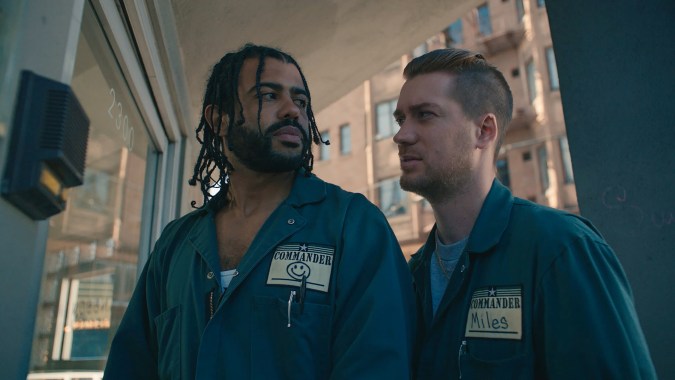Blindspotting is as hella Bay Area a film as you’re likely to find. The pulse-pounding passion project stars its two co-writers, longtime friends Daveed Diggs (of Hamilton fame) and Rafael Casal. Diggs plays Collin, an Oakland native who’s trying to get out of trouble in his final three days of probation. That becomes harder and harder to do when he’s the sole witness of a police officer shooting an unarmed black suspect in the middle of the night. It’s an incident that threatens to widen a rift between Collin and his volatile best friend Miles (Casal). The film, which tackles police brutality, gentrification, wokeness, and racism head-on, is the result of Diggs and Casal working through contemporary hot-button issues with refreshing fearlessness.
This Carlos López Estrada-directed movie constantly asks you to re-evaluate the biases you have about people. It may be Collin’s hair and dark skin that sets prejudiced alarms off in the eyes of cops throughout the film, but it is Miles’ experience as a white guy from the hood that further complicates current discussions about race. Thorny conversations about being a minority within a minority, and how difficult it can be to disentangle what happens when you grow up at the intersection of so many different racial and ethnic communities, is precisely what Casal wanted to explore with Miles. He didn’t have to think far to understand it. Growing up in the Bay Area as a half-Irish and half-Spanish kid (with a grandmother who immigrated from Cuba), Casal was all too aware of how blurry labels like “Hispanic” and “Latino” become when you look at them closely.
“This movie is about having a complicated identity within a changing context.”
“I remember watching telenovelas growing up with my pops,” he shared with Remezcla, “and I was looking at the screen and being like, ‘Oh, none of the people I’m watching on screen look anything like any of the Mexicans I’m around!’ Because they’re all Spaniards. That’s the reality. Whether those people are actually from Spain or from Mexico, or wherever, they’re Spaniards. You just had to look at them. And so I find that identity gets so much blurrier the deeper you go into it.”
That’s why, as a kid, he always thought of himself as from the Bay Area first. Not “Latino,” not “Spanish,” not “Hispanic,” though he often had to use any combination of those in legal matters and government surveys. That affiliation with his local community also meant having a close connection to Chicano culture (it helped that his dad was into trucks). Nevertheless, Casal struggled with learning Spanish (unlike his sister who’s now a bilingual education public school teacher) and learned firsthand how easily one’s whiteness can cause others to call your background into question. He poured all of these experiences into Miles. He wanted to ask audiences to unlearn the knee-jerk assumptions we make about others based on how they look. There’s always a lurking danger in those assumptions.

You see this in the film itself. While at a party in one of the newly-built houses in Oakland that’s now owned by a wealthy tech guy, Miles is constantly mistaken by a white hipster posing in order to fit in. “You know, you don’t need to act ghetto to hang out here,” he’s told right before his anger gets the best of him. But that kind of misreading didn’t happen just in the film. Reading the reviews of his Sundance debut, Casal noted that many people were quick to assume Miles was posturing as a black guy.

“But Miles is wearing fucking Dickies jeans jacket and a slick-back,” Casal noted. “He dresses like a fucking westsider Cholo! He seems like he was raised around of bunch of fucking Mexican homeboys. But there’s so many layers that people don’t know that — like, the Mexicanos also wear gold teeth and are tatted up like that. That’s too deep of a cut for them to read into. There’s really no cultural frame of reference for Miles, so everyone just applies all the things they know about people like that, so if you’ve only seen Malibu’s Most Wanted, you put all that on him. If you listen to Eminem growing up, you put that on him. It just depends where your entry point is.”
Similarly, the discussion between Miles and his wife Ashley (Jasmine Cephas Jones, another Hamilton alum) about whether to send their boy Sean to Centro VIDA, a bilingual preschool in Berkeley, was lifted wholesale from his own experience. That’s the preschool he and his sister, along with many of his cousins, went to. The community of friends and family he still has to this day (which come from all over) started in that preschool. As he remembers it, it was a place that helped sort out what a lot of people are going through in Berkeley and the Bay Area.
“It’s like all these mixed people, right?” he shared, “So we gotta talk about identity all the fucking time, and that was a big hub for that. So it was really important for me to put it in the film. Because that is essentially what the movie is about: it’s about having a complicated identity within a changing context.”
This interview was conducted by Vanessa Erazo.
Blindspotting is now available on digital platforms and on DVD/Blu-Ray




